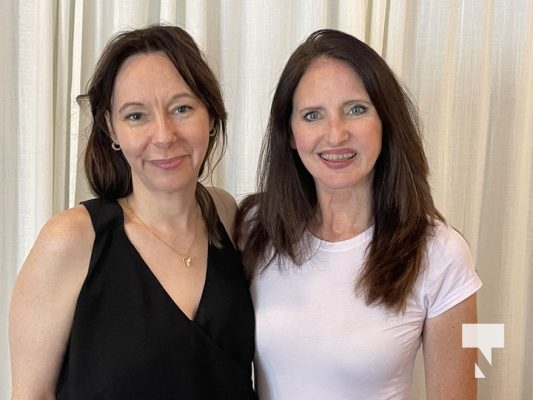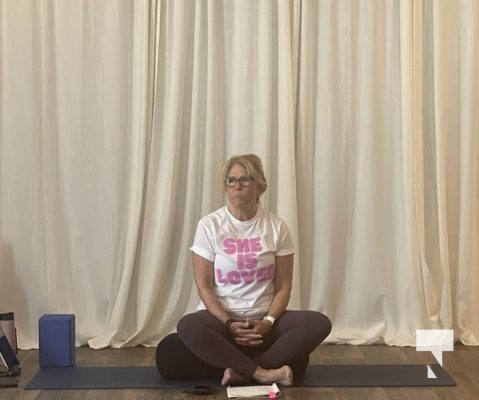By Cecilia Nasmith/Today’s Northumberland\Saturday’s pop-up yoga events in Cobourg and Whitby were in support of a future free from violence against women through the Kimberley Project.
This registered Canadian charity was founded by Catherine Dunphy, who observed so many women suffering and so many shelters filling up and realized it is preventable. Then, when her sister-in-law Kimberley Black was assaulted, she focused her efforts to just that end.
“It’s preventable,” Dunphy said in a recent interview with Today’s Northumberland.
“These are not personal crimes – it actually costs Canadians a lot of money every year just to deal with the aftermath of violence against women.”
The violence was most spectacularly on display in 2020, when an abuser embarked on Canada’s biggest recorded killing spree in Nova Scotia after an attack on his partner.
“The one thing that we see from that, and also from the gentlemen who were running across Saskatchewan murdering people – in both instances, we know these men have mental-health issues that were a kind of hold-over from childhood trauma.”
Early action is key to making that long-term difference, she said, helping children understand their own emotional landscapes and focus on conflict resolution and peaceful outcomes.
Dunphy’s drive to reach this goal took shape after the summer-night attack on a family member. Black described wanting to take a break from a demanding master’s thesis that evening, then deciding to disconnect and take a walk – even her cell phone was left behind.
She felt safe. She was strolling a route she often took in a nice Whitby neighbourhood, “literally spitting distance from the police station.”
The last thing she recalled was realizing she was being followed, then waking up three weeks later – although she was found the next morning.
Black may not remember the actual attack, but the results are undeniable. Her jaw was shattered, her skull and ribs were fractured, her lung was punctured. There was extensive nerve damage to her face, resulting in such things as loss of vocal range. She has no sense of smell and taste, thanks to the brain damage.
“From the neck down, I am pretty much back to normal. From the neck up, it’s still a work in progress,” she said.
Black feels that attack every time she looks in a mirror or tries to eat. She still feels to consequences to her life, her social life, her income and her marriage.
Those costs are undeniable, Dunphy said, and so are the dollars-and-cents cost to society in dealing with the aftermath of these events.
Domestic violence – Each year Canada spends about $7.4-billion responding to the aftermath of domestic violence.
Sexual assault – Each year, some 600,000 sexual assaults occur in Canada, of which only about six in 100 are reported to police. Even given this low proportion of reported incidents, the estimated cost for these crimes is $4.8-billion per year. And despite the high cost, Dunphy terms the conviction rate for perpetrators abysmal.
She considers this kind of violence to be 100% preventable, if more focus could fall on the perpetrators and the influences that surrounded and shaped them at an earlier age. The Kimberley Project is partnering with organizations as far away as the United Kingdom in developing proactive early-intervention curricula and programming of a kind that has been shown to return $11 for every $1 invested. The potential to affect our national Gross Domestic Product is estimated at up to $150-billion.
Dunphy salutes what she termed the “strong warrior women” who overcome these tragedies and remembers those who have not been able to with initiatives aimed at building resilience and developing critical thinking.


























